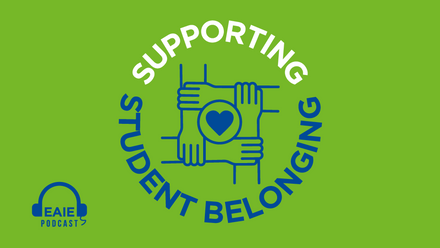Mental health in cultural perspective: rethinking adaptation

In late October to early November I would typically get more knocks on my door. Having worked as a psychological counsellor supporting international student populations for over ten years, this was to be expected.
During the months of August and September, when students started arriving to their new campus life, everything was exciting, new and colourful. As seasons changed, many incoming students began facing the challenges of cultural adaptation, for which international universities tend to be well prepared. In fact, our team was ready to facilitate the most efficient tools supporting cultural adaptation: socialising opportunities, language instruction, country-specific information, access to peer support and, last but not least, psychological counselling sessions for those who required them.
More support needed
However useful these tools might be, oftentimes it students need more support. In recent years, a trend that counselling centres at international universities have come to recognise is that many international students who come from political hotspots or war zones have already experienced persecution, various forms of discrimination or even forced migration that led them to suffer post-traumatic stress, among other disorders. Imagine what it might be like to live and study in places like Syria, Palestine, Venezuela or Afghanistan! Thus, for many international students who were already dealing with these burdens, facing the challenges of acculturation could require intensive clinical support and more services from various university units.
Any notion of well-being evolves within a particular cultural context that shapes the ways in which health and illness are understood and experienced.
In fact, concerns about the mental health and well-being of college-aged students is not only related to international students. A US survey among presidents and student affairs leaders of higher education institutions indicated that mental health was their greatest concern for students (Brunner et al., 2017).
The point here is that supporting mental health among college-age students, and particularly international students, is simply much more complex than helping their cultural adjustment. Accepting this fact leads to a whole set of questions that international universities should consider: are counselling services prepared to deliver the kind of intensive clinical care that some international students need? Should psychological services aimed at international students differ from those that local students receive? What kinds of expertise are required when treating international students? And, is addressing those needs the sole responsibility of counsellors, or other university units as well?
The “C” factor in mental health
The World Health Organization defines mental health as “a state of well-being in which every individual realizes his or her own potential, can cope with the normal stresses of life, can work productively and fruitfully, and is able to make a contribution to her or his community”. What might be necessary to add to this definition, is that any notion and idea of well-being obviously evolves within a particular cultural context that shapes the ways in which health and illness are understood and experienced. This is what I would call the “C” (for ‘cultural’) factor in mental health.
A survey among presidents and student affairs leaders of HEIs indicated that mental health was their greatest concern for students.
As international students come to university campuses, they bring their cultural assumptions about health and illness with them. For the most part, counsellors with a cross-cultural orientation or trained in cross-cultural psychopathology are ready to offer a treatment plan that is sensitive to the needs of students from various cultures. However, not all mental health professionals are trained to deliver culturally sensitive interventions, which might create the risk of a disconnect between the person who needs the treatment and the person – and system – that provides it.
This begs the question: what are the special qualities of a culturally competent mental health professional? According to Sue et al. (1982, 1992), the following capacities are crucial:
- Cultural awareness (a sensitivity to their own cultural values and biases);
- Cultural knowledge (comprehension of the client’s culture, world view and treatment expectations); and
- Cultural skills (the ability to intervene in a manner that is culturally sensitive).
As good as this sounds though, providing culturally sensitive treatment and support does not happen in a vacuum, and systemic interventions need to be considered as well. At the institutional level, the “Comprehensive Counseling Center Model” (CCC), described by Brunner et al. (2017), builds a community of support and seeks partnerships and joint work with “campus allies” who advocate for the counselling centre’s role on campus. In this way, all concerned community members support the psychological well-being of the international student body, and contribute to making a difference in their adjustment to their new lives.
Facing outward, facing the future
Traditionally, great emphasis has been placed on the need for international students to adapt and adjust to their new campus life when going abroad. But what about international universities? Are they ready to face outward and welcome the future of assuring culturally sensitive and holistic psychological support for international students when needed? Are they willing to adapt and provide the necessary support that the ever-changing psychological needs of international students demand?
And what about internationalisation professionals? Could they conceive of their roles also as ‘allies’ of culturally-sensitive mental health initiatives as well as resources for students who might be too afraid to knock on the door of a counsellor?
Facing outward requires all of us to let go of our traditional roles and comfort zones to dare to face the challenges of adaptation together, if we want to create a truly inclusive – and psychologically healthy – life on campus.
References
Brunner, J., Wallace, D., Keyes, L., & Polychronis, P. (2017). The Comprehensive Counseling Center Model. Journal of College Student Psychotherapy, 31(4), 297-305
Sue D. W., Arredondo P., & McDavis R. (1992). Multicultural counseling competencies and standards: a call to the profession. Journal of Counseling Development, 70(4), 477–86.
Sue D. W., Bernier, J. B., Duran, M., Feinberg, L., Pedersen, P. B., Smith, E. J., & Vasquez-Nuttal, E. (1982). Position paper: cross-cultural counseling competencies. Counseling Psychology, 10(2):45–52.






